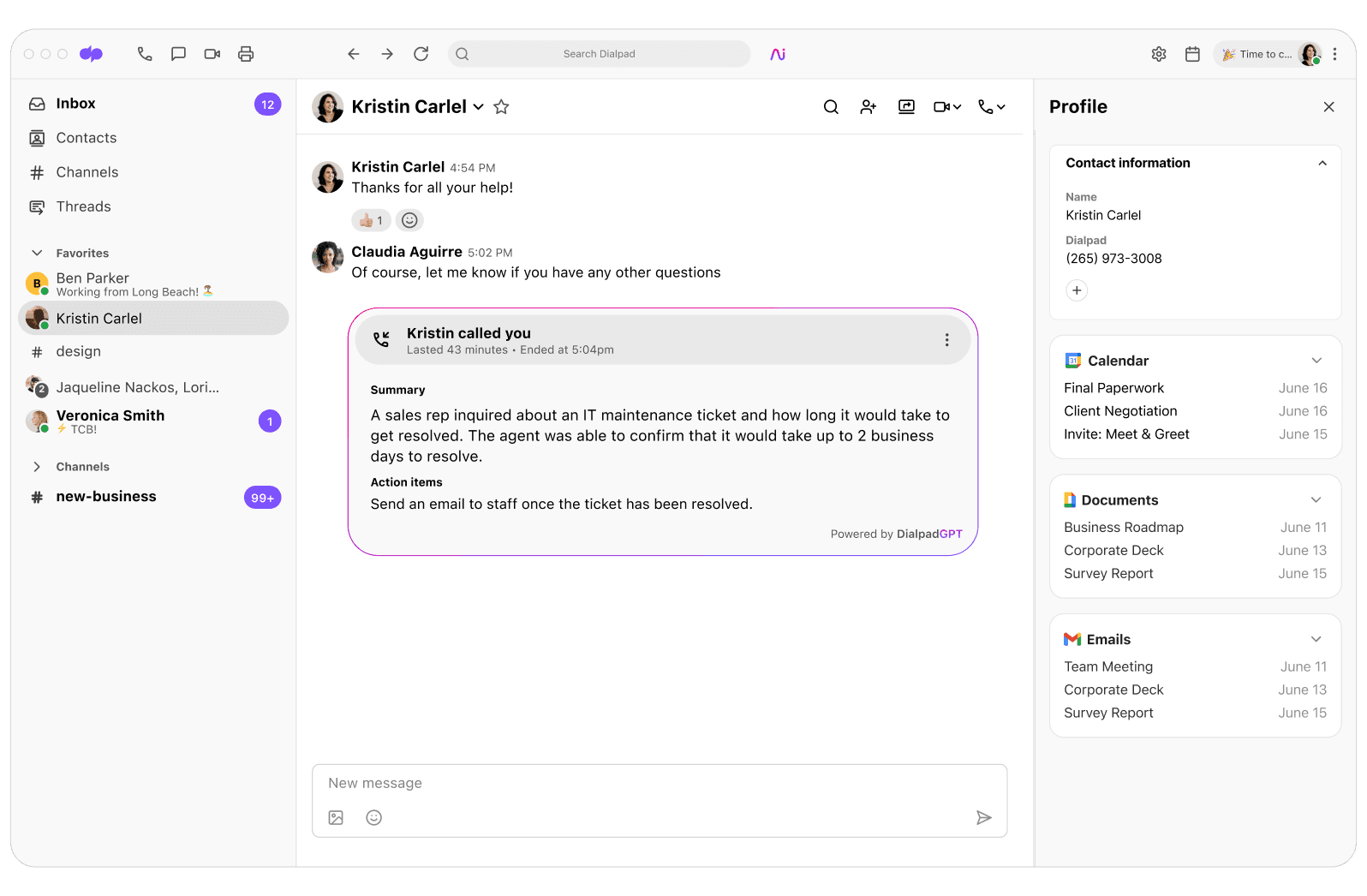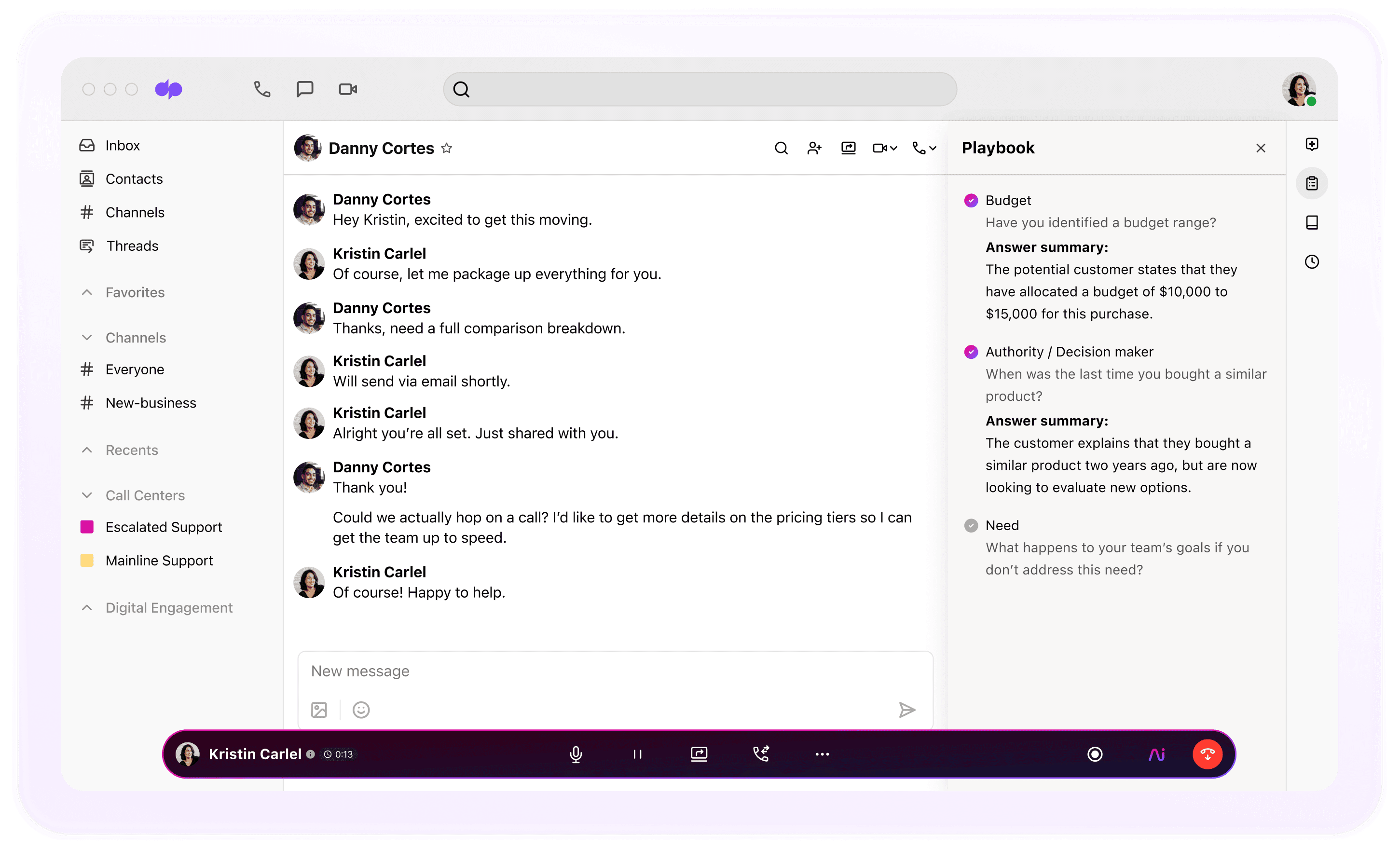
Tags
Share
In the competitive world of sales, businesses are constantly seeking new ways to engage with prospects, streamline sales processes, and shorten sales cycles.
Enter conversational AI, a revolutionary technology that is already transforming the sales landscape by providing more seamless and personalized experiences—for both customers and sales reps.
In this blog post, I’ll walk you through how we are building conversational AI for sales here at Dialpad and practical use cases for not only increasing sales, but also improving coaching and efficiency.
What is conversational AI?
Conversational AI refers to a type of artificial intelligence technology that can engage in more human-sounding conversations with users. You may have interacted with conversational AI before, such as when you chatted with an airline’s virtual agent on WhatsApp or on their website.
How does conversational AI work?
Most conversational AI systems use automatic speech recognition, natural language processing, and machine learning to understand and respond to text or voice inputs, enabling them to interact with customers in a more natural and intuitive way.
Unlike traditional customer service chatbots, which follow predefined scripts, conversational AI can understand context, handle more complex queries, and provide more personalized responses.
What is automatic speech recognition (ASR)?
Automatic Speech Recognition (ASR) is a technology that enables computers and devices to understand and process human speech by converting spoken language into text.
This is achieved through the use of complex algorithms and models that analyze the sound waves produced during speech, breaking them down into phonetic units and then mapping these units to corresponding text.
What is natural language processing (NLP)?
Natural Language Processing (NLP) is a field of artificial intelligence that focuses on the interaction between computers and humans through natural language. NLP combines techniques from linguistics, computer science, and artificial intelligence to process and analyze large amounts of natural language data.
By leveraging machine learning and deep learning models, NLP systems can learn from vast datasets, identifying patterns and structures in human language. This allows them to perform complex tasks such as summarizing texts and analyzing the sentiment of a conversation.
What is machine learning?
Machine learning is a subset of artificial intelligence that focuses on developing algorithms and models that enable computers to continuously learn from and make predictions or decisions based on data. Unlike traditional programming, where a computer follows explicit instructions, machine learning allows systems to identify patterns, adapt to new information, and improve their performance over time without being explicitly programmed for specific tasks. (For example, Google Maps is always getting more accurate over time using machine learning.)
The importance of conversational AI for sales
Even though companies are exploring benefits of conversational AI for customer service, marketing, and other business areas, there are a few benefits for sales teams specifically.
1. A sales team that doesn't sleep
Conversational AI on your company’s website and social media channels is available 24/7. If prospects reach out while your sales reps are off the clock, your sales conversational AI can still provide instant responses to questions about pricing, features, and get prospects to fill out their information in a form for follow-up later.
2. Greater efficiency
Sales reps and leaders are busy. They’re in and out of meetings all day, with both prospects and team members. Instead of having to take notes for every meeting, what if they could have a neatly packaged summary, with notes about action items and key takeaways?
Conversational AI can do that, which allows reps to focus on the conversation with the prospect instead of frantically typing up notes:

3. More effective coaching and training
Instead of sales coaches and leaders having to trawl through hours and hours of call recordings and transcripts, conversational AI can analyze interactions in real time and provide valuable insights into whether reps are following sales playbooks, asking the right discovery questions, and handling objections effectively.
For sales reps in the middle of a call, these solutions can also act as AI virtual assistants that provide helpful answers in the moment. For example, Dialpad’s Ai Agent Assist feature can detect when keywords and tricky questions are spoken on a call:

How does the use of conversational AI differ from the use of chatbots in sales?
Conversational AI | Chatbot | |
Responses | Advanced understanding of intent and context, can handle complex interactions | Scripted responses, limited to predefined scenarios |
Personalization | High; can use data to provide tailored responses and improve over time with machine learning | Low; follows fixed scripts and cannot learn from interactions |
Experience | More natural, human-sounding interactions | Can feel robotic and impersonal |
Scalability | Highly scalable and can handle the increasing complexity that comes with high call volumes | Limited scalability and requires manual updates when adding new or more complex interactions |
Flexibility | Very flexible and can adapt to different languages, dialects, and industry-specific jargon | Less flexible; struggles with variety in language and complex queries |
What are the use cases of conversational AI for sales?
There are many use cases for sales teams that are interested in conversational AI. Here are just a few of them.
1. Lead qualification and nurturing
Conversational AI can engage with potential leads in real-time, asking qualifying questions to understand their needs, budget, and timeline. By analyzing responses and behavior, AI can also prioritize leads for sales follow-up, increasing efficiency and focusing efforts on high-potential prospects.
2. Real-time agent assists
Most sales coaches are overseeing large teams of sales reps. They don’t have time to individually coach every single call. Conversational AI can “talk to” reps and provide them with tailored notes on tricky topics. Dialpad Ai, for example, can automatically pop up these Agent Assists on sales reps’ screens when those keywords come up on sales calls.
3. Performance analysis
Conversational AI can also help managers who are doing QA on sales calls. Most sales teams have to follow a specific playbook or sales methodology, like BANT or SPICED.
AI can check if reps are following through on those playbook tasks in their conversations with prospects.
For example, we use Dialpad Ai to speed up this review process—it can check whether reps ask about budget or purchase timelines, understand whether the behavior was met, and check the task off the list (or let managers know if this is something the rep needs to work on):

4. Competitive insights
As we touched on earlier, sales conversational AI can do more than just answer questions from reps and prospects. It can also act as a conversation intelligence platform for sales, that helps your team understand at a glance how every single disco call and demo went.
A great competitive use case here is to have conversational AI analyze sales conversations and show you how often your competitors’ names are coming up in sales calls.
How it works: Our sales leaders can create “Custom Moments” in Dialpad to track “Competitor X” and ‘Competitor Y” as keywords. If Dialpad flags that those names are being spoken on calls with prospects, they can click into the transcripts and recordings of those calls to get more context:

Step-by-step guide to implementing conversational AI for sales
1. Define your goals
First, clearly define what you aim to achieve with conversational AI. Whether it's lead generation or increasing sales conversions, having a clear goal will help you tailor your strategy and narrow down what type of conversational AI features you’ll need
2. Choose the right platform
Select a conversational AI platform that integrates with your existing sales tools and CRM systems. Look for features that your team will need to hit the goals you just defined. For example: Do your reps sell on multiple channels? What kinds of analytics do your execs need? Can the solution scale with you?
3. Train your AI
Invest time in training your conversational AI to understand your business, products, and customer base. With a solution like Dialpad, all you have to do is link your existing knowledge base or repository of information, and the AI will learn and tailor itself to your existing data. With other generic AI platforms, your team may have to spend more time and effort on training.
4. Monitor and optimize
Continuously monitor the performance of your conversational AI and gather feedback from both your customers and sales teams. Use this data to make necessary adjustments and optimizations.
How can businesses measure the effectiveness of conversational AI in sales?
You can measure the benefits of using conversational AI in sales through a number of key metrics. Here are a few to consider:
Conversion rates: Track how conversational AI impacts conversion rates throughout the sales funnel. Measure the percentage of leads generated by AI that convert into customers compared to other lead sources.
Engagement metrics: Monitor engagement metrics such as time spent in conversation, number of interactions per session, and bounce rates. Higher engagement typically indicates that customers find the AI interactions valuable and are more likely to continue through the sales process.
Sales cycle efficiency: Analyze the impact of conversational AI on the length of the sales cycle. Determine if AI accelerates the process and reduces response times.
ROI and cost savings: Calculate the return on investment (ROI) of implementing conversational AI by comparing costs saved (e.g., time saved on training and coaching, decreased lead acquisition costs) against the benefits gained (such as increased sales revenue, improved customer retention).
Key features to look for in conversational AI tools for sales
If you’re looking for the best conversational AI app for sales, here are a few essential features to look for:
Who’s providing the AI: Many conversational AI solutions today don’t actually have their own AI platform—they’re simply integrating with LLMs like ChatGPT or Gemini. This means that these solutions will need to be trained specifically on your company’s data before they can be used effectively, and also brings in security concerns. (If you’re in a regulated industry like healthcare or law, how can you securely input your customer data into a third-party AI tool?)
Security and compliance: In the same vein, make sure your AI tool adheres to data security standards (like GDPR, HIPAA) and offer robust security measures to protect customer data and privacy.
Integration capabilities: Choose a tool that integrates with your existing sales stack, like your CRM (e.g., Salesforce, HubSpot), marketing automation platforms, and customer support tools.
Analytics and reporting: Look for tools that provide insights into KPIs like conversation metrics, customer sentiment analysis, and CSAT (customer satisfaction).
Scalability and reliability: Not all AI tools can handle large volumes of interactions without compromising performance. If you’re having hundreds or thousands of conversations with prospects every day, your AI tool should be especially reliable, with high uptime and minimal downtime.
Training and Support: Evaluate the training and support options provided by your conversational AI tool. Look for comprehensive documentation, training resources, and responsive customer support to assist with implementation, troubleshooting, and ongoing optimization.
In conclusion, there are a lot of benefits to using conversation AI, from real-time analysis to coaching insights. Choosing the right tools to achieve the intended benefits is critical to success of conversational AI.
Shorten sales cycles and grow revenue with Dialpad conversational AI for sales
There are so many ways to use conversational AI to empower your sales team, from reps to managers, to hit their number every month.
From live transcriptions of calls, to real-time sentiment analysis, and automated coaching, we’re only scratching the surface of what AI can do.
Learn how sales teams at companies like SiteMinder and Atmosphere TV are using Dialpad Ai Sales to close more deals!









